-
|
15 October 2021
|Posteado en : Reportage
Ana María Yunpanqui is one of the few women mayors that Peru has. And the first in the history of its municipality, Pomata, in Puno, whose lake represents one of the most significant basins in South America.
Ana María Yupanqui did not have it easy. Belonging to the Aymara ethnic group, which she herself considers “very sexist”, she was one of the few rural women who managed to continue with their education. She managed to finish high school and study outside her municipality to graduate as a Contadora (accountant) in Puno. “I wanted to do something for my community, and although basically not even my family supported me, I was confident I could do it, even if I was a woman and a young one“, explains the mayor of Pomata, a municipality of around 20,000 inhabitants.
At 33 years old, she is one of the 19 women who has managed to become mayor in Peru, the first in the history of her municipality. She believes that she won the elections because people, tired of corruption, chose to give a woman the opportunity to exercise another type of leadership. “There are leaders who can’t accept being governed by a woman. But the peopleput their trust in us and as a woman I can’t let them down, because I can serve as an example for others in years to come”, she stresses.
“We have many problems, our population earns their living purely from agriculture, livestock and fishing, and gender violence has a very significant impact on the lives of our women. The pollution of the lake is also a key issue”, explains the mayor.
Ana María Yupanqui comes from a rural area and knows all about the needs of rural women who, in this COVID-19 crisis, have been among the hardest hit. As she points out, in remote villages, especially the most marginalised ones, measures are needed to ease the burden of care and share it out better between women and men. Sufficient basic services and infrastructures are also needed to support women’s domestic and care work that is unpaid, which is exacerbated by the crisis. “We have to empower rural women so they can stand up for themselves”, says Pomata.
The EUROsociAL cooperation programme, financed by the European Union and managed by the FIIAPP, is working to improve the governance of Lake Titicaca and meet the demands of the main environmental and social challenges of its population, the majority of which are from Aymara and Quechua indigenous communities that live at an altitude of 4,200 metres, with little State presence and high rates of poverty and marginalisation.
Specifically, the Democratic Governance area of the EUROsociAL+ programme, managed by the FIIAPP, through its Territorial Development line, has accompanied the Binational Autonomous Authority of Lake Titicaca (ALT) in the implementation of a strategy for coordination between various levels of government that also incorporates other non-institutional actors. The ALT has also taken lessons learnt from the European experience, for better management of water resources and sanitation projects that reduce inequality, vulnerabilities and social exclusion.
-
|
11 July 2021
|Posteado en : Interview
Interview with María Eugenia Rodríguez Palop, vice-president of the European Parliament’s Committee on Women’s Rights and Gender Equality
On the occasion of the Generation Equality Forum, the global meeting held in Paris to promote gender equality after the setbacks of the pandemic, in association with the European Union EUROsociAL+ programme, we interviewed María Eugenia Rodríguez Palop, vice president of the Commission on Women’s Rights and Gender Equality to analyse some of the main challenges.
Can we be satisfied with the new European Gender Equality Strategy 2020-2025?
This strategy has been a real step forward as it considers violence against women in a very comprehensive way. It has ratified the Istanbul Convention, underscoring the stance of the governments that have not ratified it and that promote disinformation campaigns about this convention in the European Union. I do not think that we are going to see a comprehensive directive that covers all male violence, but steps are definitely being taken in the recognition of gender violence as a European crime.
It also seeks to put forward specific measures to eliminate all forms of workplace segregation that exist in the employment market. There are completely male and female sectors that include cleaners, supermarket cashiers, health workers and workers in social services. These women are not only underpaid, they are undervalued from a social and cultural point of view. This is one of the questions that the strategy addresses.
We want care services to be looked after, to be public, accessible and universal. We want working from home not to be used to overload women and for the work of women in the world of care to be valued, as well as attending to their working conditions and health. We also need to ensure that a greater and better representation of women is achieved in the economic space and on the boards of directors.
Are we moving towards a European Pact for care services?
I would say without any doubt that progress is being made because before they were not even considered whereas now they are. It should also be pointed out that the social pillar of the European Union, which was the poor relation when compared to EU law and politics, is today much stronger. The minimum wage and wage transparency directive, which is being discussed in the European Parliament, will undoubtedly improve the lives of people and the lives of women in particular because it will expose and hopefully even eliminate the 14% salary gap that exists today between men and women. This gap then translates into a pension gap of 37%, which means that elderly women are far worse off than their male counterparts.
In addition, the conciliation directive has been strengthened, meaning that more pressure will be placed on countries to implement it. This is very important in the world of care, which is a world of women and which is completely feminised.
The segregation suffered by women in the public and work space is due to the overload of domestic tasks, making it essential to legislate on the co-responsibility of women and men within the home.
In short, it seems to me that we are certainly closer to a Europe of care than we were before.
At FIIAPP we work a lot with Latin America. What challenges do we share with the region in terms of gender issues?
I think there are many challenges that we share with Latin America. First and foremost is the fight against male violence. as well as the fight for sexual and reproductive rights. A week ago, Parliament struggled to draw up a resolution to urge all Member States to guarantee the right to safe and legal abortion. In Latin America, progress has been made in Argentina and hopefully in Chile as well. But the extent to which reproductive rights are violated in some regions like Central America is very worrying.
I would say that equality between men and women has not been achieved anywhere. Although Europe is moving forward and we must be optimistic, it is moving at a snail’s pace – something that the European Institute for Gender Equality has strived to highlight. The levels of poverty suffered by women in Latin America are clearly not comparable to what women suffer in the European Union, but, once again, the challenge to achieve equality remains in a number of places. There may be different dimensions, with the problem existing to a varying extent; nevertheless there are objectives that we can absolutely share with Latin American women. In the International Women’s Day strikes on 8 May, this global dimension was evident, as women face very similar problems all over the world.
-
|
28 December 2018
|Posteado en : Reportage
There is still a long way to go to include persons with disabilities in all of our daily lives. This is why FIIAPP is working on projects such as Bridging The Gap to make this path ever shorter
“Any restriction or absence in the ability to perform an activity in the manner or within the range considered normal for a human being.” This is how the World Health Organization (WHO) defines disability. Definition published in 1980 in its International Classification of Deficiencies and Disabilities (CIDDM).
Likewise, the WHO estimates that more than one billion persons live with some type of disability, which represents 15% of the world’s population. More and more people belong to this group, which is closely related to the ageing of the population and the increase in chronic diseases.
For its part, the United Nations (UN), says that persons with disabilities tend to have fewer economic opportunities, more limited access to education and higher poverty rates. It also highlights that “children with disabilities are four times more likely to be victims of violent acts, the same proportion as adults with mental problems,” demonstrating the need to develop legislation to protect them. It must additionally be added that these people also face a series of obstacles such as transport and access to information.
Access to health, education and employment
Health is considered a fundamental right for society. However, for persons who have some type of disability it is extremely important, since their illness can improve or worsen depending on the healthcare provided, such as rehabilitation.
Although it seems somewhat paradoxical, persons with disabilities need more healthcare on a regular basis, but benefit the least from this right, since 50% do not have access to healthcare. According to the WHO, many persons with disabilities do not have sufficient resources to pay for their treatments, despite the fact that 80% of persons with some type of disability live in developed countries.
However, health is not the only area affected, these difficulties also extend to education. According to data from the National Institute of Statistics, there are currently around 560,000 disabled students in Spain between 16 and 17 years of age. Of these, 16.5% are in special education centres and the remaining 83.5% attend ordinary education. The number of students with disabilities is high but a high percentage of young persons with disabilities do not attend school, 43%.
At the global level, children with disabilities are less likely to attend school, especially if they are poor. We also found inequality in access to education between boys and girls. Therefore, “mechanisms must be improved to integrate girls with disabilities into the education system, and bring gender into the 2030 Agenda“. Says Ola Abu, Director of Research and Global Influence at the Leonard Cheshire charity.
Of the 3.84 million persons with disabilities in Spain, 481,000 are working. In relation to employment, persons with disabilities had a low participation in the jobs market in 2017, since according to INE data, their activity rate was 35%. Likewise, women with disabilities had a smaller presence in the labour market than men, a fact that shows the long journey that remains to inclusion and equality.
The world outlook is not very different since the employment rate of men and women with disabilities is much lower than those without.
Persons with disabilities in the 2030 Agenda
In its commitment to “not leave anyone behind”, the UN’s 2030 Agenda on Sustainable Development reflects the importance of inclusion and improvement in the conditions of persons with disabilities. The tenth objective of the 17 in the Agenda deals with the inclusion of persons with disabilities.
As we have previously indicated, persons with disabilities have difficulties when accessing health services. In this context, the UN emphasises that these people are up to five times more likely to face health expenses that are described as “catastrophic”.
Bridging The Gap
It is very important that international cooperation becomes a fundamental tool that allows governments to give visibility to persons with disabilities by including them in their political agendas. In addition to these, both society and institutions must come together to translate the needs of these persons to give them a voice and improve their current situation in the best possible way.
Ecuador, Paraguay, Burkina Faso and Ethiopia have benefited from this European Union-financed and FIIAPP-managed projectBridging The Gap. This project aims to reduce the social exclusion of persons with disabilities in low and middle income countries in Africa and Latin America.
The situation in the countries where Bridging The Gap works is complicated. According to Boukary Savadogo, permanent secretary of the National Multisectoral Committee for the Protection and Promotion of Persons with Disabilities in Africa, “in Burkina Faso persons with disabilities are not welcome.” In order to improve the situation of persons with disabilities in the African country, “Burkina Faso is aligned with the SDGs and the 2030 Agenda”.
It is important that we reflect and try together to improve the mechanisms so that persons with disabilities can have a dignified, full life in which they can enjoy each and every one of their fundamental rights.
-
|
31 May 2018
|Posteado en : Reportage
A number of projects managed by FIAPP are taking part in the European Development Days 2018, with gender equality as the overarching theme
“Women and Girls at the Forefront of Sustainable Development: protect, empower, invest” is the slogan chosen for the European Development Days 2018, which will be held next week in Brussels. On 5 and 6 June, the capital of Europe will also be the capital of development.
This is because, this year, the days organized by the European Commission have gender equality as their central theme. As well as promoting the participation of women in the various forums, this edition hopes to make this a safer, more open and more inclusive world for all of them.
The most important development event in the world, which is open to the public, will pack 500 meetings into two days, in which more than 2,600 speakers will take part. Among them will be 7 Nobel laureates and 100 world leaders. FIAPP will also be attending the European Development Days (EDD) to represent four of the projects that it manages: EUROsociAL+, Bridging the Gap, Triangular Cooperation and EUROCLIMA+.
The EUROsociAL+ programme promotes cooperation and dialogue between the European Union and Latin America on promoting public policies to improve social cohesion and reduce inequality in Latin America.
However, for Enrique Martínez, Communication technician for the programme, “these public policies are only effective when they attack the inequality gap between men and women, a challenge and a goal that are strongly etched into the EUROsociAL+ DNA”.
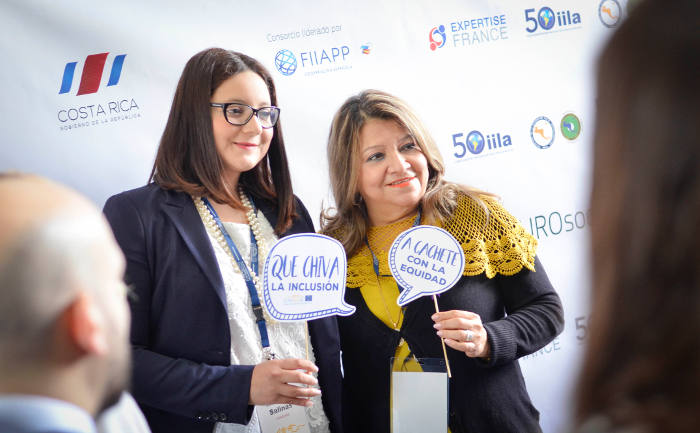
This is why, in Brussels, the programme is sharing three advances in gender equality policies, in Paraguay and Mexico and, at the regional level, in Latin America. In addition European transfer on this subject.
The executive director of the Social Cabinet of the Office of the President of Paraguay, Mirta Denis, the executive secretary of the Mexican Institute for Women, Marcela Eternod, the director of Fundación Género y Sociedad, Ana Isabel García Quesada, and the French State Counsellor, Marisol Touraine, make up “100% female EUROsociAL+ panel as a contribution to this collective journey to full equality”, said Martínez. In addition, the round table discussion will be opened and closed by Jolita Butkeviciene, Director for Latin America and the Caribbean at the European Commission Directorate General for International Cooperation and Development.
The Bridging the gap project is also taking part in the 2018 European Development Days, with a session on Women on the rise – no one left behind!, organized jointly by the EU Social Protection Systems Programme and the NGO Light for the World. This is the presentation video:
The aim of this session, according to Carmen Serrano, the project’s communications technician, is to “show that, in spite of the two-fold discrimination that disabled women face, they are spearheading sustainable development in low-income countries”. Four women will therefore share their experiences of gender and disability issues based on the different viewpoints tackled by the three viewpoints structuring the session: Social protection, leadership and entrepreneurship, and access to work and economic empowerment. It will be moderated by Hisayo Katsui, a researcher into and expert teacher on disabilities.
However, said Serrano, “The aim of presenting “Bridging the Gap” at this great European event is not just to share experiences but to create a dialogue and reflection on the role of women with disabilities in their communities”. This is why they have chosen to use the format of a Brainstorming lab. For 75 minutes, there will be constant interaction between the speakers and the audience so as to collect inputs and ideas on how everyone can create awareness among those around them of the contribution that women with disabilities can make to society.
The Evalúa project, which seeks to promote Public Policy Evaluation in Latin America and the Caribbean, will attend the EDD’s for the first time to talk about some of the results obtained since its inception in 2014.
The project coordination team will attend this international cooperation forum to present one of its most recent projects, the results of the evaluation of the Costa Rican Gender Equality Policy. Also, the management, led by the Ministry of Planning (MIDEPLAN) evaluation team, will be represented by Ericka Valerio, from the Evaluation and Monitoring department.
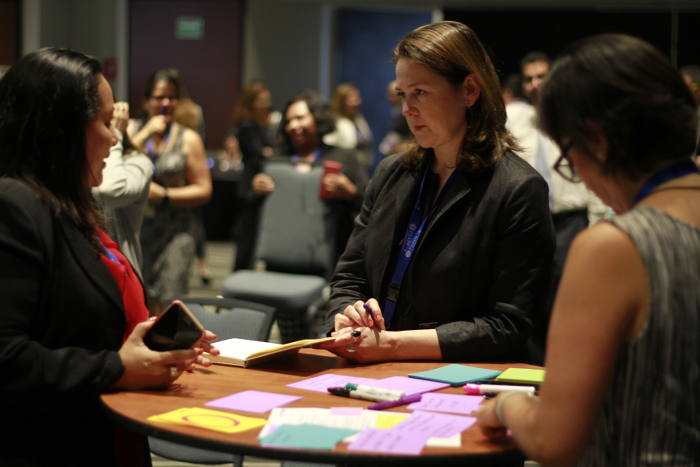
The project is part of the ADELANTE programme, which aims to improve integration in Latin American and Caribbean countries and to contribute to their reaching their development goals (SDG). The EDD will be an important place for presenting the major conclusions and recommendations of that public policy evaluation and the planned use of this evaluation as an input to the following stages.
According to Alina Orrico, a project technician, “It is especially important to take part in this event, in which there are much fewer Latin American experiences than from other continents and, above all, because it is taking place in a year filled with emotions, demands and allusions to the need to present tangible answers that will guarantee gender equality.”
EUROCLIMA+ is the European Commission’s regional programme to promote environmentally sustainable development in Latin America. This action benefits the most vulnerable population groups, focusing in particular on gender, the impoverished rural population and indigenous peoples.
During the event, a video will be projected on Gender and Climate Change and an information map of Latin America will be drawn using gender-related information.
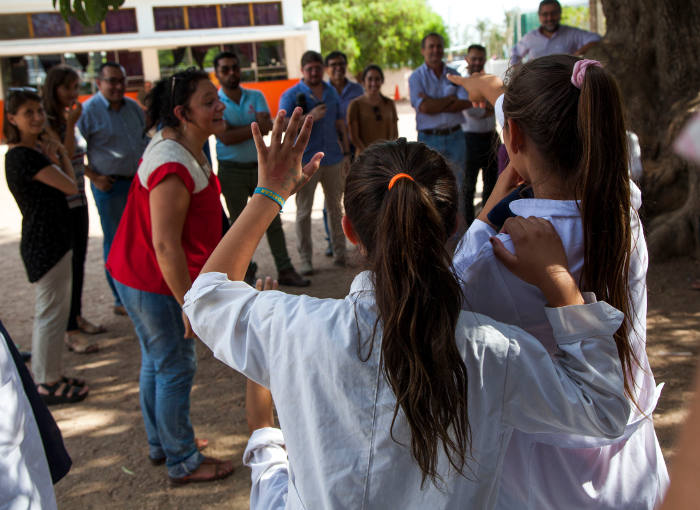
EUROCLIMA+ helps countries to develop their Nationally Determined Contributions or NDCs to the Paris Agreement. NDCs reflect the commitment of the international community to facing up to the effects of climate change.
According to Alexandra Cortés, an expert in Communication and Visibility for the programme, NDCs “promote the inclusion of climate action in a policy framework that can lead to economic growth and social development, in addition to protecting the environment and climatic resilience”.
-
|
08 March 2018
|Posteado en : Reportage
Agenda 2030 counts on cooperation as a tool for advancing the gender equality that is being publicly demanded
“On International Women’s Day, we must commit ourselves to doing everything possible to overcome entrenched prejudices, support participation and activism, and promote gender equality and the empowerment of women”. These are the words of António Guterres, Secretary General of the United Nations, on International Women’s Day. Another 8 March for reflecting on what has been achieved and what remains to be done in terms of equality.
In 1995, almost 200 governments signed a historic road map in Beijing for achieving equal women’s rights. Two decades later, movements in favour of that equality continue to fill the streets and social networks throughout the world. In the face of this joint and global progress, international cooperation can be a key tool to achieving this equality.
Mar Merita, a technician specialising in gender with the EUROsociAL+ programme – which is funded by the European Commission and managed by FIIAPP – affirms how much innovation has taken place regarding the role of women in the Agenda 2030 framework for cooperation.
From ensuring that children have an equitable and high quality education, through ending all forms of discrimination and violence against women and girls throughout the world, to making equality one of the Sustainable Development Goals (SDG) established by several world leaders for a better world in 2030.
Equality in the EU
Gender equality is also one of the founding values of the European Union, which closely follows these development objectives. It also analyses progress towards these objectives through a periodic study.
The latest one (Sustainable Development in the European Union, 2017) provides data on four specific areas that serve as indicators when evaluating the goal of equality: gender violence, access to education, employment and positions of responsibility.
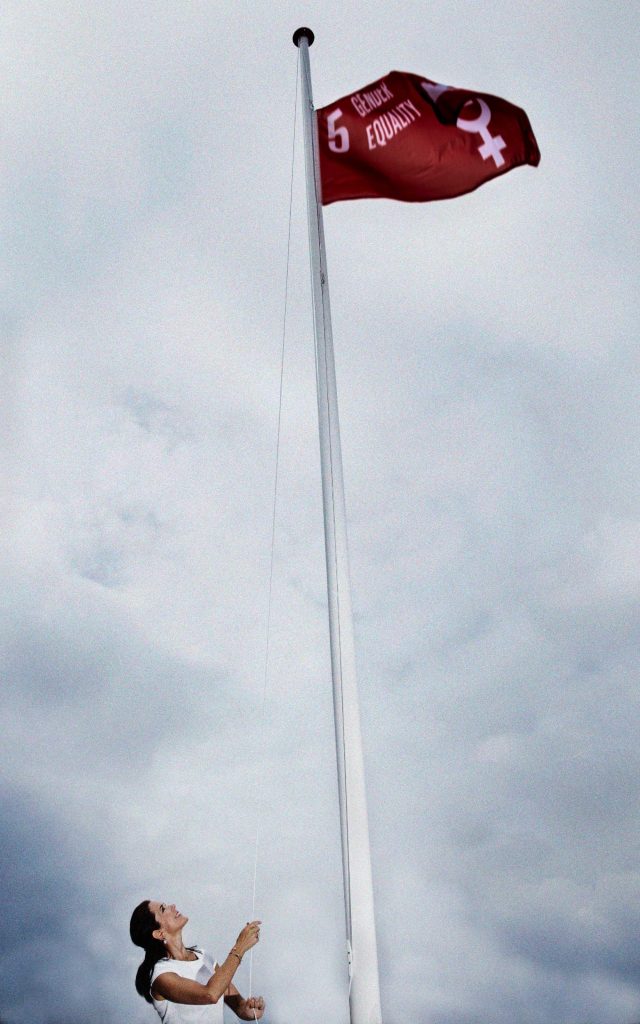
Gender violence is a reality in the EU in 2012. Where one in three women say they have experienced physical or sexual violence since they were 15 years old. This problem is the cause and consequence of inequality, and the fight against it begins the moment children gain access to education.
However, the fact that men drop out of school earlier and women are more successful in this area is not reflected in the employment rate of recent graduates, which is higher for men. In addition, the proportion of men of working age in employment exceeds that of working women by 11.6%.
Employment is one of the areas that is most linked to gender roles, family responsibilities and traditions. And it is reflected in the wage gap: in 2015, according to the same study, women earned 16.3% less per hour than men. The same difference as 5 years ago.
Progress has a cost in what Mar calls the “third generation of rights”, which would include this difference in wages that continues to be significant in most countries. According to the expert from EUROsociAL+, despite the progress in the recognition of political rights, there is still work to be done regarding social, cultural and economic rights; through which that “real equality” would be achieved.
The distribution of political positions and positions of responsibility also reflects inequality, since women do not usually have as much representation as men in decision-making processes. While the proportion of seats held by women in national parliaments has increased since 2003, women still held less than one third (28.9%) of these seats in 2017.
Cooperation as a tool
Many of these issues, such as the wage gap and sexual harassment, are the focus of current events. These have included public denunciations, with a strong international impact, which nevertheless need “processes for dealing with these problems”.
Dominique de Suremain, coordinator of the gender equity policy area for the EUROsociAL+ programme, believes she sees “less visible work for change” when these demands materialise and are reflected in the system.
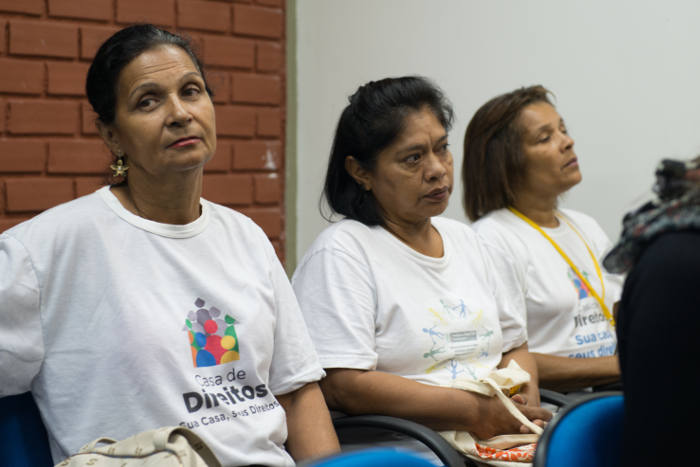
This is where cooperation comes into play, it has an essential role in the implementation of public policies that take these demands into account. It is important, according to Dominique, “to introduce that concern into the design of the projects” from the outset. It is a cross-cutting issue that must not only be applied in social projects, but it is also relevant for all the themes.
An example would be the gender focus workshop organised by ARAP Ghana – an anti-corruption project managed by FIIAPP – or the inclusion of this perspective in the activities of Euroclima+. In the end, inequality is inherent in the society in which it occurs and it influences the problems that society addresses.
However, this approach is often insufficient to achieve real equality. We must go beyond the diagnosis, the indicators, to quantify how many women have benefited: “We must take advantage of cooperation projects in order to play a proactive role,” according to Dominique.
Perhaps for this reason, EUROsociAL+ is one of the first programmes to create an exclusive thematic area to address this problem. A strong gender component or axis that has direct actions and a team of people exclusively dedicated to it.
Cooperation is based on an exchange of experiences, which is also important for Mar Merita: “you can fight inequality by promoting examples and good practices that arise in countries”, by learning from each other.
“Equality is a universal cause” and a realistic objective that, within the framework of the projects, needs public policies in order to make practical progress. Although in the end what is really important, according to the expert, is to believe in it.
Listen to the programme dedicated to International Women’s Day on our space on Spanish National Radio





